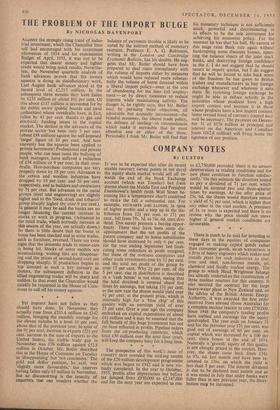COMPANY NOTES
By CUSTOS
IT was to be expected that after its recent sizable recovery (seven points in ten days) the equity share market would sell off to- wards the end of the Stock Exchange account (which was Tuesday) but fresh alarms about the Middle East and President Eisenhower's health (with Wall Street be- coming like a temperature chart) contrived to make the fall a substantial one. For example, STEWARTS AND LLOYDS, In Spite of higher profits and a step up in the dis- tribution from 12+ per cent. to 174 per cent., fell from 78s. 3d. to 74s. 6d. cum divi- dend. This surely presents a buying oppor- tunity. There may have been some dis- appointment that the net profits of the parent company and its home subsidiaries should have increased by only 6 per cent. for the year ending September last (indi- cating some reduction in profit margins), but those of the overseas companies and other trade investments rose by 32 per cent. and the total net profit of the group by over 15 per cent. Why 21 per cent. of the 5 per cent. rise in distribution is described as a 'cash bonus' is not clear, seeing that the total dividend is covered about five times by earnings, but taking 17+ per cent. as the new rate the shares would yield over 41 per cent. at the present price, which is unusually high for a 'blue _chip' of this quality with an earnings yield of over 23 per cent. Over a year ago the company embarked on capital expenditure of about £41 million and it may be assumed that the full benefit of this huge Investment has not yet been reflected in profits. Pipeline orders from the oil-producing countries, which total £50 million over the next four years, will keep the company busy for a long time. * * * The prospectus of this week's issue of coNsErr IRON revealed the striking results of the .£20 million development programme which was begun in 1942 and is now vir- tually completed. In the year to October, 1955, profits after depreciation but before tax jumped from £930,000 to £2,147,000 and for the next year are expected to rise to £2,750,000 provided 'there is no serious deterioration in trading conditions and the new plant continues to function satisfac- torily.' On this estimate the directors intend to pay a dividend of 7+ per cent. which would be covered two and three-quarter times by earnings. At • the offer price of 25s. 6d. the shares would therefore return a yield of 56; per cent. which is higher than any other in the steel market. A premium of ls. or more is expected and there is no reason why the price should not move higher if general market conditions are favourable.
* • •
There is much to be said for investing in these days in the equities of companies engaged in making capital goods rather than consumer goods. HEAD WRIGHTSON is a firm of heavy engineers which makes and installs plant for such industries as coal, iron and steel, non-ferrous metals, oil. chemical and finally nuclear energy. The group to which Head Wrightson belongs has already undertaken the construction of three nuclear reactors for this country. It also secured the contract for the large heavy-water plant in New Zealand and, on the advice of the British Atomic Energy Authority, it was awarded the first order received from abroad (from Australia) for a complete nuclear reactor to cost £750,000. Since 1948 the company's trading profits have trebled and earnings for the equity quadrupled. The year ends on January 31 and for the previous year 17+ per cent. was paid out of earnings of 66 per cent. on capital which was increased by a 100 per cent, share bonus at the end of 1954. Naturally a 'growth' equity of this quality is not cheaply priced in the market. How- ever, the shares came back from 134s. to 97s. 6d. last month and have now re- covered to 126s. on which the yield is less than 3 per cent. The interim dividend is due to be declared next month and as it was stated in July that order books were fuller than in any previous year, the distri- bution may be increased.


































 Previous page
Previous page